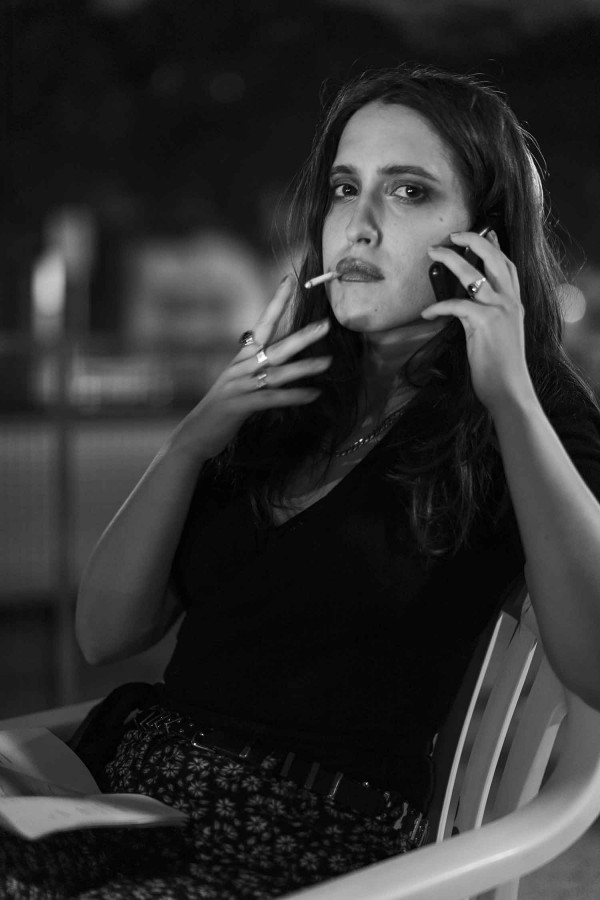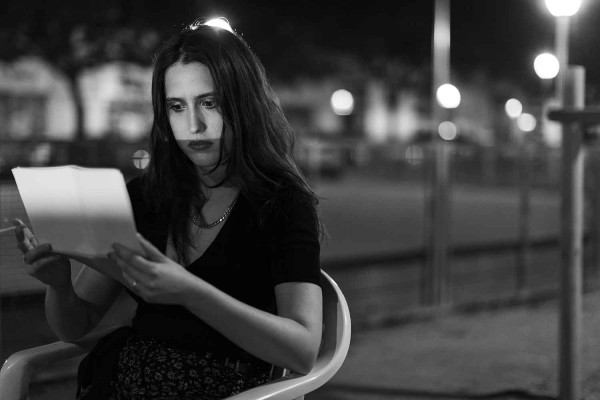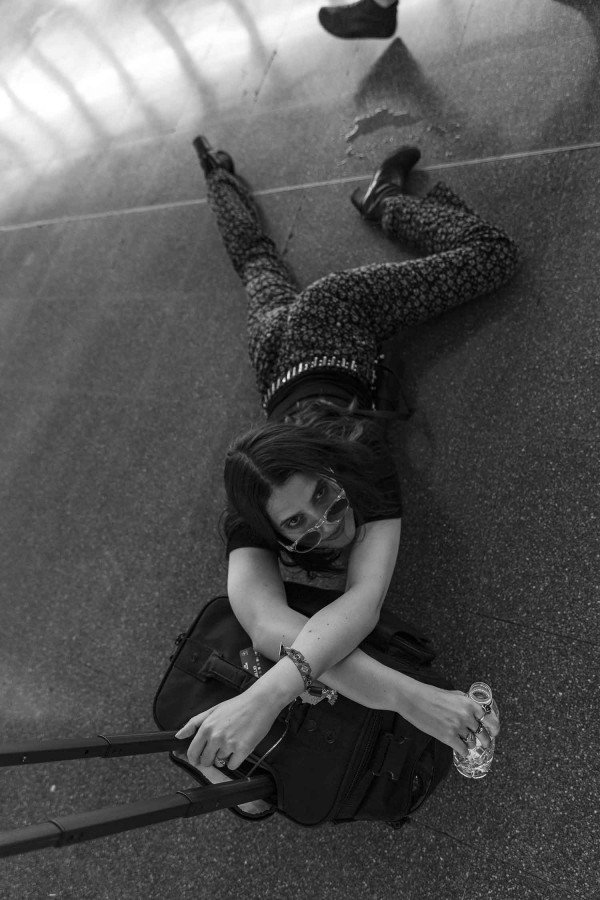Helena Hauff: “Why I am actually doing this?”
The end of a long night can be quite absurd. Hamburg DJ and producer Helena Hauff had only just finished her set at Sónar Festival in Barcelona ten minutes earlier, when she suddenly was lying on the floor of the backstage area, crawling around laughing.
Why? That’s the wrong question. It should actually be: why not? Because if there is one thing that characterizes Helena Hauff, it is her unconditional belief in the freedom to do exactly what she wants: “Club culture is about going crazy together for one night, drinking a little, being a bit silly and feeling shit the next morning. The idea is to let yourself go, doing something you don’t do every day.”
She has learned how to do this in the sociopolitically charged milieu of Hamburg’s Golden Pudel Club. Helena Hauff not only used to spend most of her nights there, the Pudel, as its visitors affectionately call the club, was also the place where she started DJing – she had only played twice before and both times it was more of a bar context. She could not have wished for a better field of experimentation, since it was set away from the constraints of target groups and fulfilment. Matching her self-assured vision of her own role as an artist, she does not consider it to be so drastic: “At the end of the day you can allow yourself to do whatever you want wherever you are”.
 Nevertheless, Helena Hauff was shaken when it burned down on the night of February 14, 2016. By now it has been rebuilt, but a lot has happened for Hauff in between that tragic night and the reopening. Back then she was considered an insider tip and was occasionally on the road for gigs, but now she has reached the top of the international DJ scene and plays more than 100 sets a year on every continent – and there is no end in sight for this enthusiasm, her dirty, raw, abysmal sets, in which she combines melancholy electro sounds with uncompromising techno, are too unique.
Nevertheless, Helena Hauff was shaken when it burned down on the night of February 14, 2016. By now it has been rebuilt, but a lot has happened for Hauff in between that tragic night and the reopening. Back then she was considered an insider tip and was occasionally on the road for gigs, but now she has reached the top of the international DJ scene and plays more than 100 sets a year on every continent – and there is no end in sight for this enthusiasm, her dirty, raw, abysmal sets, in which she combines melancholy electro sounds with uncompromising techno, are too unique.
And all of this without being part of the social media actionism that seems to be indispensable today. On the contrary. Helena Hauff stays clear from social media in contrast to the never-ending self-promotion mania of the pop music industry. “Being on Facebook would be too personal for me. I don’t want to give away all that much of myself. And what would that be? That I’m drinking coffee in Italy and that it tastes great?”
She still make room in her schedule to DJ at Pudel despite her new life circumstances, Helena Hauff tells me when we meet a few hours before her Sónar performance. The hotel bar is already closed, so we just take our drinks outside and sit down at an abandoned intersection in the industrial area of Barcelona, where the Sónar by Night is taking place. “The Pudel is not a job for me, not a stopover,” she continues. “I want to really be there and be a part of it all night long. I definitely don’t want to have a booking for the next day. I don’t want to tell the people at the Pudel that I have to go home because I have to catch a flight the next morning. I am not going there to play my two-hour festival set.
Helena Hauff opens her set at Sónar with “The Smell Of Suds And Steel”, a track from her new album “Qualm”. The white label has just arrived from the factory and you can tell that she is very happy to be playing it for the first time. A very personal start to a dramaturgically perfect set.
This talent also characterizes the album which will be released on the British label Ninja Tune. On it Hauff combines crude acid sounds and ambient pieces. So she remains true to herself in her approach to albums, which, in contrast to her single releases, are also allowed to explore sound concepts beyond the dance floor. Although the predecessor “Discreet Desires”, released on Darren Cunningham’s (Actress) label Werkdiscs, was “a bit – in quotation marks – more poppy, a bit more synthesizer-heavy”, as she herself classifies it. “For “Qualm” I wanted to get back to this totally cranky, hard, acid-jam sound.”
With “Qualm” Hauff also continues her fondness for album titles that exist both in English and German, but mean very different things. The predecessor was entitled “Gift” (gift/poison), and now its smoke and qualm. However, she does not have any scruples herself, she replies amusedly to the question about her own. “What? Me? No! I do produce a lot of smoke!”
Looking at Helena Hauff’s discography of three albums and two handfuls of singles, one might think that she unconditionally loves to hide away in the home studio after a strenuous weekend. This, however, is not the case. ” By now, I am wondering why I am actually doing this? At first, I was really into buying synthesizers and learning how to produce music. Now that I don’t have much time to spare, I sometimes really have to force myself to go to the studio. I’m not so sure if I’m going to be sick of it sometime soon. “
This definitely has nothing to do with general symptoms of fatigue. Because she is very sure that she would never be sick of playing records. Maybe it’s just the classic third album dilemma: “It’s getting harder and harder”, Hauff explains. “You don’t want to repeat yourself, but at some point you might be depleted, you just can’t bring up new energies anymore. I’m not afraid of this, but I can imagine that at some point I’ve reached the moment where I think I’ve gotten everything out of the machines.”
 Machines are an important keyword to understand the world of Helena Hauff. Integral for her productions and ultimately also her sets is her overwhelming love for the classical machines of the techno and electro universe, the Roland Rhythm Composers TR-707 and TR-808, the Roland Analog Synthesizer TB-303 and also the Akai MPC Sampling Workstation. Just as her DJ sets could not be imagined without records, her productions thrive on the sound world of these machines and the organic process in dealing with them: “When you work with machines, there is an immense number of coincidences, unforeseen combinations and mis-programmings that will culminate in beautiful things you never thought of, and what would not happen so easily with computers.
Machines are an important keyword to understand the world of Helena Hauff. Integral for her productions and ultimately also her sets is her overwhelming love for the classical machines of the techno and electro universe, the Roland Rhythm Composers TR-707 and TR-808, the Roland Analog Synthesizer TB-303 and also the Akai MPC Sampling Workstation. Just as her DJ sets could not be imagined without records, her productions thrive on the sound world of these machines and the organic process in dealing with them: “When you work with machines, there is an immense number of coincidences, unforeseen combinations and mis-programmings that will culminate in beautiful things you never thought of, and what would not happen so easily with computers.
The set at the Sónar is coming to an end. At one side of the stage is now Thomas Martojo, co-manager of the Amsterdam Dekmantel Empire, which is one of the most influential institutions of the current techno wave with its conglomerate of label and festival. It is very very loud, but the emphasis in his voice, which is necessary for this, fits in with what he says: “Isn’t she fantastic? She’s going to play the final set on our main stage on Sunday this year.” The final set at Dekmantel, you cannot put it any other way, represents the definitive arrival of Helena Hauff at the Champions League of electronic music.
But the music is still playing at Sónar. The sun is slowly creeping up from behind floor and the people on the dance floor are now going completely crazy – after the set Helena Hauff will amusingly comment that she only noticed at that moment that she was playing outside, since she was too immersed in the sound the whole time. This doesn’t even leave a full professional colleague such as Scottish house DJ and enfant terrible Jackmaster cold. From the dancefloor he comments on the set: “Helena Hauff just blew my fuckin heed aff” and posts a video in which it just rattles and rumbles (Hauff is playing “Cruelry” by Omar Contri). Techno can be so wonderfully brutal. Then it is suddenly quiet – and the morning sun shines on a floor full of happily exhausted people.
Meanwhile Helena Hauff is back on her feet again. The shuttle to the hotel is already waiting. In just a few hours she will continue to Berlin, where she will play at a party at Tresor with the very telling title “Let´s Watch UFO´s”. This sounds just like a night to her liking, a night with the potential to be silly.
Translation by Denise Oemcke.
A german version of this article was first published on Spiegel Online.
One day and night with Helena Hauff in Hamburg:



















